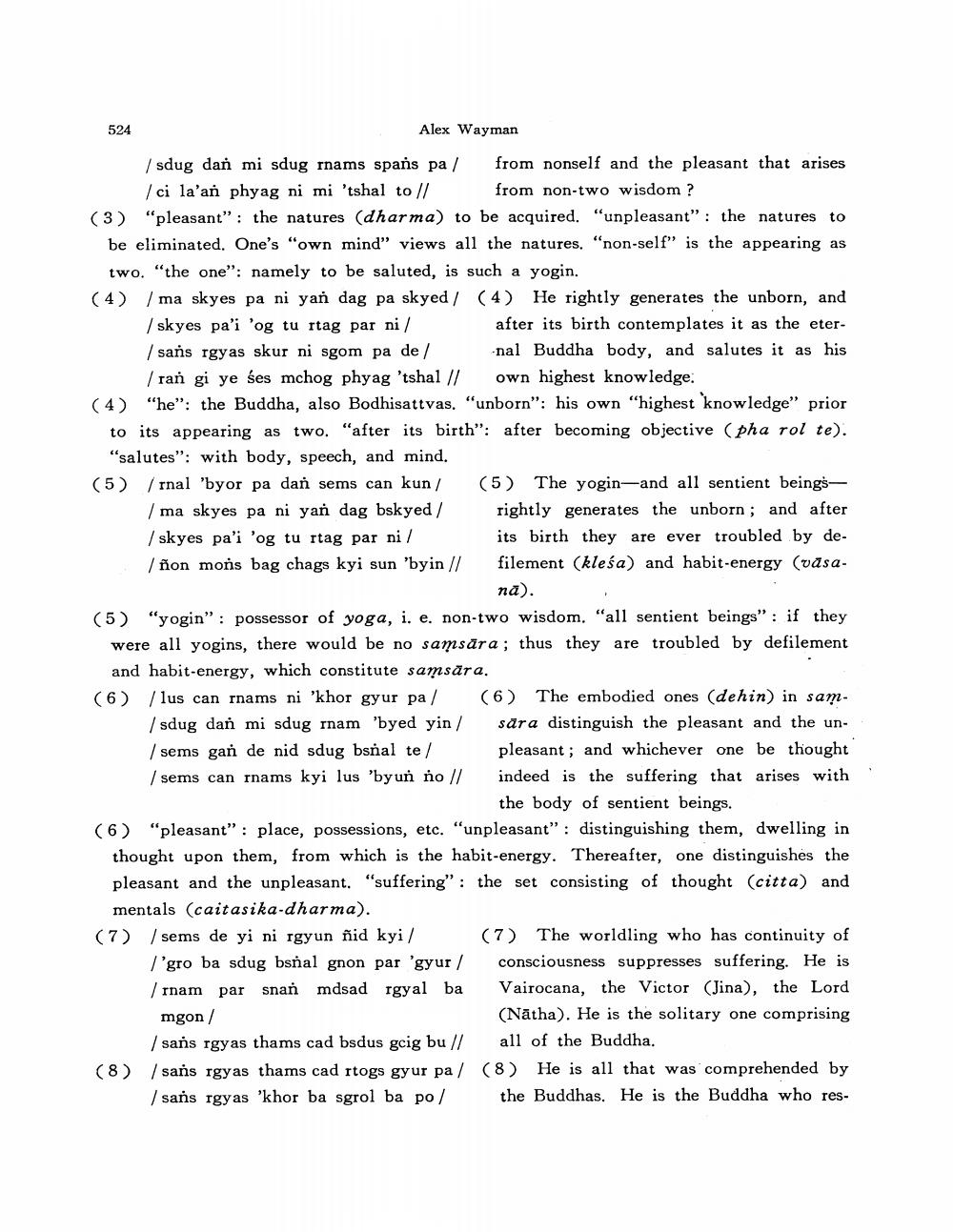Book Title: Sarva Rahasya Tantra Author(s): Alex Wayman Publisher: Alex Wayman View full book textPage 4
________________ 524 Alex Wayman / sdug dan mi sdug rnams spans pa / from nonself and the pleasant that arises / ci la'an phyag ni mi 'tshal to // from non-two wisdom ? (3) "pleasant": the natures (dharma) to be acquired, "unpleasant": the natures to be eliminated. One's "own mind” views all the natures. "non-self" is the appearing as two. "the one": namely to be saluted, is such a yogin. (4) / ma skyes pa ni yan dag pa skyed / (4) He rightly generates the unborn, and skyes pa'i 'og tu rtag par ni / after its birth contemplates it as the etersans rgyas skur ni sgom pa de nal Buddha body, and salutes it as his ran gi ye ses mchog phyag 'tshal || own highest knowledge. (4) "he": the Buddha, also Bodhisattvas. "unborn": his own "highest knowledge” prior to its appearing as two. "after its birth": after becoming objective (pha rol te). "salutes": with body, speech, and mind. (5) rnal 'byor pa dan sems can kun / (5) The yogin-and all sentient beings ma skyes pa ni yan dag bskyed / rightly generates the unborn ; and after skyes pa'i 'og tu rtag par ni / its birth they are ever troubled by de|ñon mons bag chags kyi sun 'byin / filement (klesa) and habit-energy (vāsa nā). (5) "yogin": possessor of yoga, i. e. non-two wisdom. "all sentient beings": if they were all yogins, there would be no samsāra; thus they are troubled by defilement and habit-energy, which constitute samsära. (6) / lus can rnams ni 'khor gyur pa / (6) The embodied ones (dehin) in sam. sdug daň mi sdug rnam 'byed yin/ sara distinguish the pleasant and the un| sems gan de nid sdug bsnal te pleasant; and whichever one be thought sems can rnams kyi lus 'by un no 11 indeed is the suffering that arises with the body of sentient beings. (6) "pleasant”: place, possessions, etc. "unpleasant”: distinguishing them, dwelling in thought upon them, from which is the habit-energy. Thereafter, one distinguishes the pleasant and the unpleasant. "suffering": the set consisting of thought (citta) and mentals (caitasika-dharma). (7) sems de yi ni rgyun ñid kyi) (7) The worldling who has continuity of l'gro ba sdug bsňal gnon par 'gyur / consciousness suppresses suffering. He is rnam par snan mdsad rgyal ba Vairocana, the Victor (Jina), the Lord mgon/ (Nātha). He is the solitary one comprising sans rgyas thams cad bsdus gcig bu // all of the Buddha. (8) / sans rgyas thams cad rtogs gyur pa/ (8) He is all that was comprehended by / sans rgyas 'khor ba sgrol ba po / the Buddhas. He is the Buddha who resPage Navigation
1 2 3 4 5 6 7 8 9 10 11 12 13 14 15 16 17 18 19 20 21 22 23 24 25 26 27 28 29
